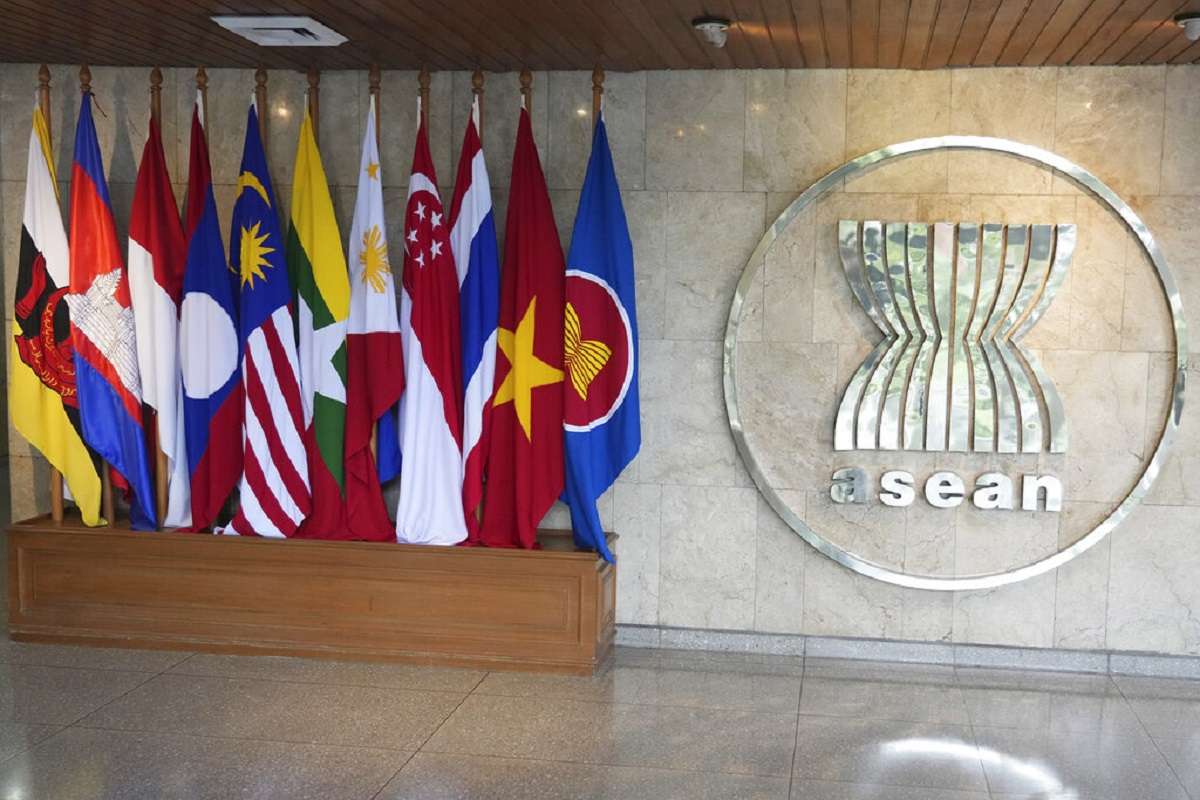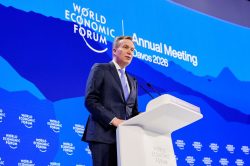
National flags of ASEAN members are on display inside the ASEAN building in Jakarta, Indonesia, Friday, Feb. 3, 2023.
15:45 JST, February 3, 2023
JAKARTA, Indonesia (AP) — Southeast Asian foreign ministers are meeting in Indonesia’s capital Friday for talks bound to be dominated by the deteriorating situation in Myanmar despite an agenda focused on food and energy security and cooperation in finance and health.
Myanmar belongs to the 10-member Association of Southeast Asian Nations, but the annual ministers’ retreat is being held in Jakarta without Myanmar’s Foreign Minister Wunna Maung Lwin.
The absence was forced by the fallout over Myanmar’s lack of cooperation in implementing a five-step agreement made in 2021 between ASEAN leaders and Myanmar’s military leader, Senior Gen. Min Aung Hlaing.
In the agreement, Myanmar’s military leaders promised to allow a special ASEAN envoy to meet the ousted and jailed leader Aung San Suu Kyi and others to foster dialogue aimed at easing the crisis.
Last year, when ASEAN was chaired by Cambodia, Min Aung Hlaing was not invited to the November meeting of ASEAN leaders in Phnom Penh after Myanmar declined to let an ASEAN envoy meet with her.
Analysts said the shadow of the military takeover in Myanmar looms large over the foreign ministers’ meeting, even as Indonesia, the chair of ASEAN this year, seeks to dampen concerns that the issue will not hold the bloc “hostage.”
Kicking off the country’s year chairing the regional bloc, Indonesia’s President Joko Widodo said late last month that ASEAN would continue contributing to the Indo-Pacific as a peaceful and stable region and maintaining regional economic growth.
“Economic crisis, energy crisis, food crisis as well as warfare, we face all of them this year,” Widodo said. “ASEAN will remain essential and relevant for people in the region and beyond as ASEAN is the epicenter of growth.”
Indonesia’s Foreign Minister Retno Marsudi said Indonesia would ensure the focus is on the development of the regional bloc as a community and to capitalize on ASEAN’s economic growth, which always records stronger growth than the global economy.
“The issue of Myanmar will not be allowed to hold hostage the process of strengthening the ASEAN community development,” Marsudi said last month in outlining Indonesia’s foreign policy for the year.
She said ASEAN was disappointed by its lack of progress in the past two years in Myanmar, despite growing countermovement and global threats of sanctions and political exclusion.
“Despite all the efforts of the chair and all ASEAN member countries, the implementation of the five-point consensus by the Myanmar military junta has not made significant progress,” she said.
Marsudi said Indonesia is setting up an office of an ASEAN special envoy on Myanmar in Jakarta to spearhead how the bloc deals with the crisis and she will seek to engage with “all stakeholders” in Myanmar, noting that it is crucial to enable a national dialogue to address the crisis.
“Indonesia requests that access to all stakeholders be given to the ASEAN secretary-general,” Marsudi said last month, adding that ASEAN will also continue to collaborate with a United Nations special envoy to help Myanmar to exit the crisis.
Randy Nandyatama, an international analyst from Gajah Mada University, recommends ASEAN under Indonesia’s chairmanship review ASEAN’s bedrock principles of non-interference in other members’ affairs and decisions by consensus.
“Some of its mechanism are too loose, making it difficult for member countries to comply with the existing principles,” he said, adding that resolving the Myanmar issue is important not only for maintaining stability and prosperity in the region, but also for strengthening the legitimacy and function of ASEAN itself as a regional organization that can build dialogue with Myanmar.
“Resolving the crisis in Myanmar is the main challenge of Indonesia’s chairmanship,” Nandyatama said.
Another area of focus for Indonesia as this year’s ASEAN chair is peace and stability in the Indo-Pacific, Marsudi said, signaling that ASEAN would not be a pawn in the growing tensions between the United States and China.
“Many countries have an Indo-Pacific concept and this is where a synergy is needed, so that the various concepts will not exacerbate the rivalry,” she said
She added that the Indo-Pacific must be approached not only from a security aspect, but also from an economic development aspect and implementing ASEAN’s outlook on the Indo-Pacific will be a big step to maintain peace, stability, prosperity.
Top Articles in News Services
-

Survey Shows False Election Info Perceived as True
-

Hong Kong Ex-Publisher Jimmy Lai’s Sentence Raises International Outcry as China Defends It
-

Japan’s Nikkei Stock Average Touches 58,000 as Yen, Jgbs Rally on Election Fallout (UPDATE 1)
-

Japan’s Nikkei Stock Average Falls as US-Iran Tensions Unsettle Investors (UPDATE 1)
-

Trump Names Former Federal Reserve Governor Warsh as the Next Fed Chair, Replacing Powell
JN ACCESS RANKING
-

Producer Behind Pop Group XG Arrested for Cocaine Possession
-

Japan PM Takaichi’s Cabinet Resigns en Masse
-

Man Infected with Measles Reportedly Dined at Restaurant in Tokyo Station
-

Israeli Ambassador to Japan Speaks about Japan’s Role in the Reconstruction of Gaza
-

Videos Plagiarized, Reposted with False Subtitles Claiming ‘Ryukyu Belongs to China’; Anti-China False Information Also Posted in Japan

























